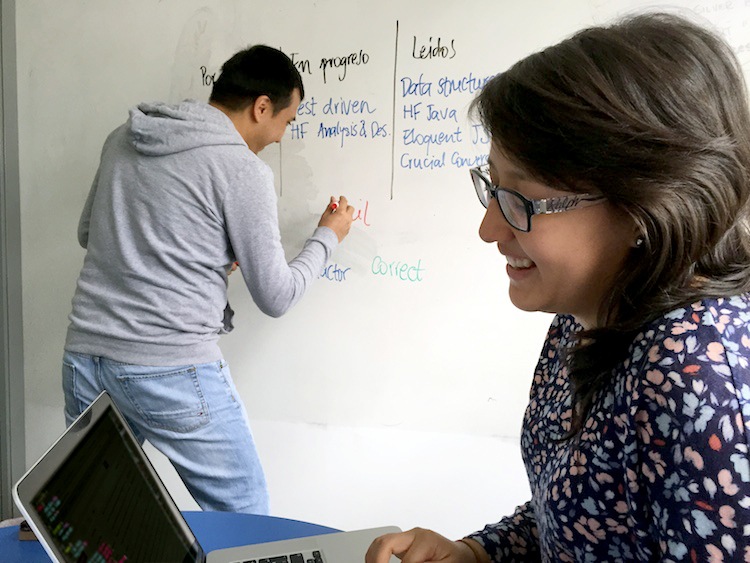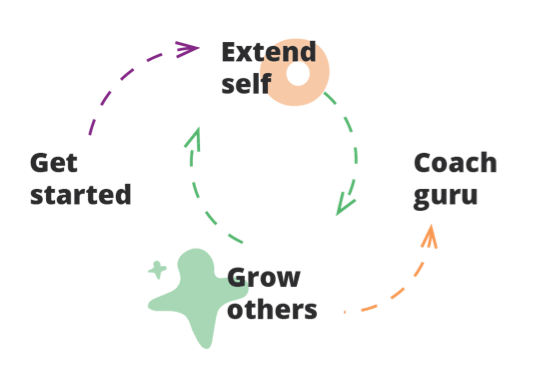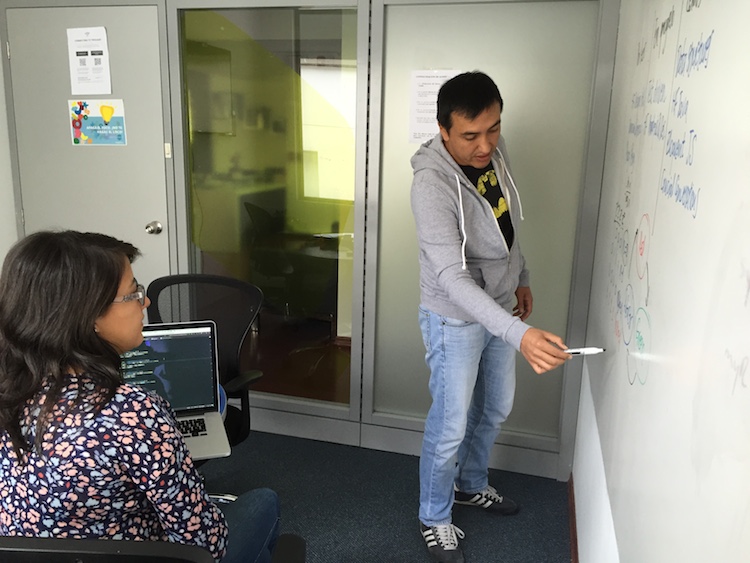
Decoding the Role of a Coach
A year ago I was asked to coach someone in the office. My first reaction was to run away! I was overwhelmed at the thought of being responsible for someone’s development and career even though I was promised the support needed and that it was going to be a great learning opportunity for me too. I eventually accepted the challenge and today I’m delighted with that decision. The first round of support came a few months ago when Jennifer Mounce visited the Thoughtworks Quito office and ran a great coaching workshop along with Marcelo Oliveira. The goal of the workshop, where the attendees were current and as well as potential coaches, was to introduce us to “coaching” and to provide some guidelines on how to become a good coach. After one whole year of coaching a fantastic developer, I didn't think it would be fair if I didn’t share a bit of my experience.

Coaching and mentoring - what’s in a name?
Coaching is helping a person explore what they want experience on. It’s their path, not yours. Coaching, when done right, should feel very close to the rubber duck problem solving technique. As a coach, your role is to ask questions but not necessarily to give answers. If you don’t talk at all and the coachee herself is asking the questions, providing those answers and discovering the path to master whatever she set to master, then you are doing fantastic!
Mentoring is when you share your experience and provide guidance. A mentor narrates his journey and explains the choices he made along the way and provides insight on the lessons learned from mistakes. The mentoree should be comfortable enough with the subject to understand why that path could be ideal for the mentoree’s journey and where to tweak it if at all; or maybe even understand why that’s not the path he should take. Book recommendations are welcome from a mentor.
This is an important difference to understand when you are looking for someone to help you to reach your goal. There are other roles - like when you want someone to help you navigate a tool or technique, what you have in mind is a trainer; and if you want someone to advocate for you, well, that’s a sponsor. Differentiating across these roles doesn’t mean, you must choose to be only one of these people. You could be a coach who knows about the tools your coachee needs to learn. You might switch hats from coach to trainer and back, as needed by your coachee. Ensure that you both understand which hat you’re wearing at any given time. Just make sure you can perform both roles at the same time and still get high fives.
Making the differentiation as a coachee side, is not to say you must choose only one of them or you should have one of each kind. You may train on the new shiny tool with your trainer in the morning and discuss your way to the top with your mentor that very afternoon. All you need to do is to make sure you make enough time for all the commitments.
I remember once my coachee, while we were exploring the basics of programming, mentioned the hard time she was having with an API design book she had been recommended by her teammates. At that point it was hard for me to go from for loops to RESTful API design just using questions so I switched hats and explained the steps we had left before we jumped into API design.
Becoming a coach.
You don’t need to be an expert on the subject to become a coach but you need to be a good listener. Coaching has a lot more to do with having the skills to let someone make a mistake and help them realize what are the lessons to be learnt than it has to do with sharing your experience and the lessons you’ve learned to help someone avoid mistakes.
When I started coaching I didn’t realise that I should be aware of the weakness and strengths of my coaching skills. I wasn’t asking many questions and suggesting solutions; this is actually training. At the end, it all worked out fine because my coachee is awesome. Prior to engaging in a coaching relationship, I strongly recommend doing a self assessment. I’ve tried Gallup’s strengthsfinder and worked very well for me, but you can find many others on the web.
Once you’ve assessed yourself, you should identify your starting point and determine what you need to work on. This does not mean you can’t begin coaching until you have developed your skills to a point you feel comfortable with; you can improve as you coach.
Coaching, like many things in life, has a cycle: first, you start coaching otherwise you can never call yourself a coach. Right after that you extend yourself - you read, you practice new things you learn and improve them a little by little. Then you help others grow and develop, which is fantastic. I bet you would like to do that forever but you must go back to growing yourself. You learn with every experience, your horizons grow and you further develop your skills. This in turn helps you coach more effectively the next time around. Finally you become a coaching guru and the cycle is complete!

Getting started.
A basic requirement as a coach is to be able to have an interpersonal relationship with the person you are coaching. An environment of trust is also essential so that you can talk about with ease.
Something that helps a lot and should be done during the first session to build trust and protect confidentiality is to arrive at rules or guidelines and set expectations. The duration of the coaching relationship should be established so that you can track success.
Extending yourself and growing others.
Extending yourself is quite difficult: it means listening to people without interruption and judgment. It means listening not so that you can respond but listening so you understand the problem. Do you remember the rubber duck? Recall how much he listens and how much he talks? His secret is that he isn’t afraid of silence. If the coachee stops talking, you should not try to fill in the void and wait for her to resume talking.
If you must speak, be curious about the root cause of the problem. Ask as many questions as you need to get to the root of the problem. Exploring is a precious skill. Remember a coach doesn’t give solutions or pass judgements. You may see your coachee walking down a death path and you will have to resist the urge to save her. Ask questions to help the coachee see where this is heading and as a last resource you can ask for permission to wear the advisor or mentor hat so that you can intervene.
Asking many questions provides a foundation to build on. Keeping track of a lot of information is hard. A simple thing I do is to keep notes as the conversation develops. Doodling as the discussion progresses is a nice record of the conversation. I always like to have some breadcrumbs to follow so that we can change track as necessary.
All this listening is so you can set your coachee into motion. This ability to convert thoughts into actions makes your coachee grow. Progress is a crucial aspect to maintaining enthusiasm and motivation. We all like the things we are good at and we are good at the things we practice. To keep the coachee on track, you should be able to set SMART goals which have intermediate goals along the way so the coachee can see accomplishments every now and then.
And when those goals are reached: celebrate! Encourage your coachee regularly. Acknowledge the coachee's effort and wins. Again, celebrate them. Not all goals will be achieved at first attempt and not all challenges will be overcome. Identify the right time to say "you can do it" but also make defeat a teacher for both the coach and the coachee. Retrospect on mistakes and retry. Walk the walk side by side.

A coaching guru.
As I write this, I have no idea how many times it is necessary to oscillate between extending yourself and growing others before you are able to break the loop and be promoted to a coaching guru. If I ever do, I will let you know. Meanwhile keep improving!
Disclaimer: The statements and opinions expressed in this article are those of the author(s) and do not necessarily reflect the positions of Thoughtworks.














